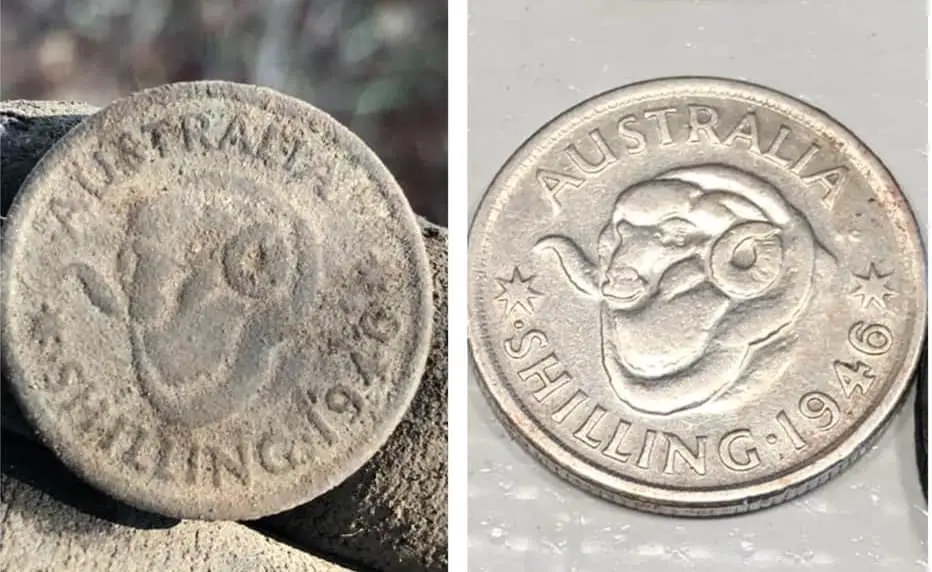
As far as I am concerned Metal Detecting is one of the most underrated hobbies. In fact, it is a great opportunity to discover history from a totally different angle by collecting some great historical finds like old coins and relics!
Indeed, finding coins is a process that you should learn. It includes using the right machine, dealing with the ground conditions as well as other factors…
.. But here in this article I want to address what you should do after collecting coins! I am talking here about cleaning your old coins and preserving them.
So, how to clean coins found metal detecting? Cleaning old coins depends on their state, the metal they are made from and how old they are. The safest way to clean them is by using a soft toothbrush with warm water. However, if they are heavily stained you can use this Highly Effective Cleaning Tool (Check it Here at Amazon)!
Cleaning old coins, relics and other types of finds is a must-learn skill. This hobby is not only about finding things, it is also about preserving their value and state for a longue time.
In this Post I will dive into several practical tips that you can easily implement to clean coins depending on the metal they are made from.
I will start this Post with some common mistakes that many hobbyists make and that you just should avoid for better results. Before moving on how you should deal with old coins and spendable ones.
Start by Avoiding these 5 Mistakes!
Cleaning coins might seem a straightforward task that you can do with ease. However, there several mistakes that you can easily fall into. That’s why I would prefer you take note of the following mistakes:
1. Failing to recognize the metal of the coin
This is probably the most common mistake that most hobbyists make. Indeed, they don’t try by any means to recognize the metal it was made from!
What happens is that they end up applying the same methods over and over again on all types of coins. Regardless of the metal they were made from. So they usually end up applying the wrong method to a given metal …
… For example, if your coins are made from copper, in most cases it is not recommended to run hot water on them. They should be treated using dry methods like a toothpick!
2. Failing to recognize the value of the coin
Generally if the coin has a date in it, or is simply rare this means that it holds a significant value for you as a collector!
If you fail to make this check, you may end up cleaning a highly valuable coin using harsh chemicals! Thus, you might devaluate it and become just worthless …
So, always have a check at the key date and how rare it is. For that, there are many books that list historical coins in the world (these books are available online). You can use them as a reference to perform your check.
Posting your find in Metal Detecting Forums is a good way to get feedback also …
After you’ve performed your check, if they hold some value, just don’t aggressively clean them. In most cases water is more than enough.
If they are average silvers you might opt for a mild abrasive like baking soda. Otherwise, if it is a modern spendable coin you can use lot of techniques like a tumbler with dish soap. I will talk about that in more details later in this Post …
Learn how to identify the value of your coins!
3. Clean while mixing different coins
That’s another common blunder that detectorists end up doing! In fact, you should never mix coins while washing them (in a tumbler for example) without making sure that they are all made from the same metal. Better yet, that they were found in the same ground conditions …
For example if you mix copper with clad coins, in most cases the clad will turn to orange or even brown tint. You should also clean cents and clad separately …
In other words, there can be different chemical reactions from different metals that you just can’t predict.
Even salts, acids etc … could be strong factors in these reactions that would have negative effects on metals.
4. Not understanding the soil conditions
Metal Detecting targets found in different ground conditions impacts also the way you should opt for to clean them. A mistake would be to use a generic cleaning method regardless of the soil type …
… Indeed, you should use numerous methods depending on the source soil conditions of the coin! Below some examples on how you should proceed:
- Clay ground has a big impact on the surface of old coins. Usually, they come out of the ground as a green glob and it is not until after you clean them that you can actually tell what you have! That’s why in this case, you should not start with any type of harsh chemical, only water and a soft toothbrush …
- Using a Toothpick and a dry soft toothbrush with lot of patience is what you would need for coins that come out of sandy soil.
- You should do the same thing for Black sand, just do it a bit more carefully!
- For Acidic soil, you should opt for gentle elements.
…. I haven’t found a best Generic way to clean coins because, again, it varies depending on the ground conditions… That’s why one of the best ways to go is to experiment different methods until you figure out the perfect one!
For more info about this Topic! I’ve put together this Post about the Different Detection Ground Conditions! I’ve tried to put as much helpful info as possible!
5. Not developing a custom cleaning routine
This point is a continuity of the previous one! Indeed, you should consider cleaning your coins and finds in general a case by case process…
… So following any general advice is rolling the dice and may not be the best choice!
If the ground conditions of your region is specific and not common, then don’t hesitate to consult a professional first! He should let you know about a proper way to approach that …
… For good quality coins in high grades many collectors prefer coins with original patina rather than shiny dipped coins. Again it depends on the coin. A heavily encrusted coin will have to be cleaned in some manner.
Never use abrasives as they will scratch the surface including many cleansers.
How to deal with Old Coins found Metal Detecting?
For Old Coins who represent a significant value for you as a collector, you should approach it in a conservative way. Below few methods that you can choose from:
1. Don’t clean them!
This would sound a little bit weird for you, but many hobbyists who collect coins constantly say a big fat NO towards cleaning old coins. They would rather leave them as they are …
Otherwise, they just think it would completely devaluate them or at least reduce significantly their value!
There is some truth to that and I would say that this is a legit approach. If you choose to do so, it would be totally fine …
… It is also a lazy approach, especially if you find old coins regularly in significant numbers. This would save you the time and effort to go out there and clean your coins every single time.
However, there are many of us that would still like to clean them up anyway. Below I dive a little bit on some of the methods you could possibly choose from …
2. Water
Using water, especially warm or even hot water is the least impacting cleaning method for your old coins!
All you have to do is to soak them in really Hot Water for a decent period of time or overnight. After that, if you find out that they are seriously valuable then there is no need to do any further cleaning.
For something heavily stained, you may want to, in addition to hot water, use a soft toothbrush.
Finally, if your coin is made out of silver and is heavily stained you can use some baking soda in addition to hot water and soft bristled toothbrush.
3. Andres pencils
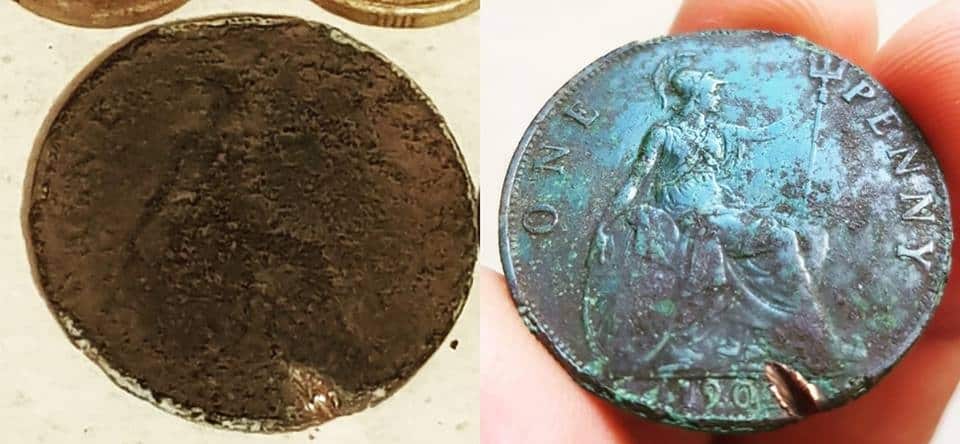
This pictures above is a result of using Andres Pencils (Check Them Here at Amazon!) … Pretty Amazing!
Indeed, if you’ve got a copper, nickel or bronze old coin then you should definitely consider using Andres Pencils. They are also highly effective for old relics cleaning …
They are designed not only to remove stains as well as hard corrosions in a gentle way.
For many detectorists, this is considered as a crucial tool like a pinpointer or a sand scoop for example.
This video below is a little demonstration of how effective this method is:
For silver coins it is generally preferred not to use this tool. You can use just a pencil eraser. It should do just fine!
4. Toothpick
This is another conservative method that you can try to clean your old finds with a minimum risk! For example, if you’ve found a golden coin (on a good day!) generally it doesn’t need to be cleaned. It only needs a little care and attention using a toothpick.
This also applies to copper and bronze coins! In most cases, professionals advice against any harsh cleaning for them…
If you’ve found them in a wet ground, you probably should wait until they are dry then side-scrape the date with a toothpick.
5. Soap and Toothbrush
If you’ve found a gold or silver coin in a dry and not acidic ground start by checking 2 things:
- That it is pretty solid and wouldn’t break easily.
- The coin actually needs to be cleaned.
If these 2 conditions are verified, then you may experience using some normal soap and a very soft toothbrush.
6. Don’t use chemicals
Chemicals and/or scrubbing will destroy in many cases the value of high end coins. Even if you find products based on harsh chemicals within a vendor who tells that it won’t hurt your find, you probably should just avoid that.
The less chemicals the better, mild detergent and a toothbrush usually does the job!
Indeed, that’s a mistake most newbies make!
How to deal with clad and spendable coins?
For spendable Coins you can use stronger methods to clean them. Actually, as they don’t hold any historical value whatsoever, you just need to clean them enough so you can spend or bank them …
… Below some helpful tips you may want to apply:
1. Ultrasonic Cleaner
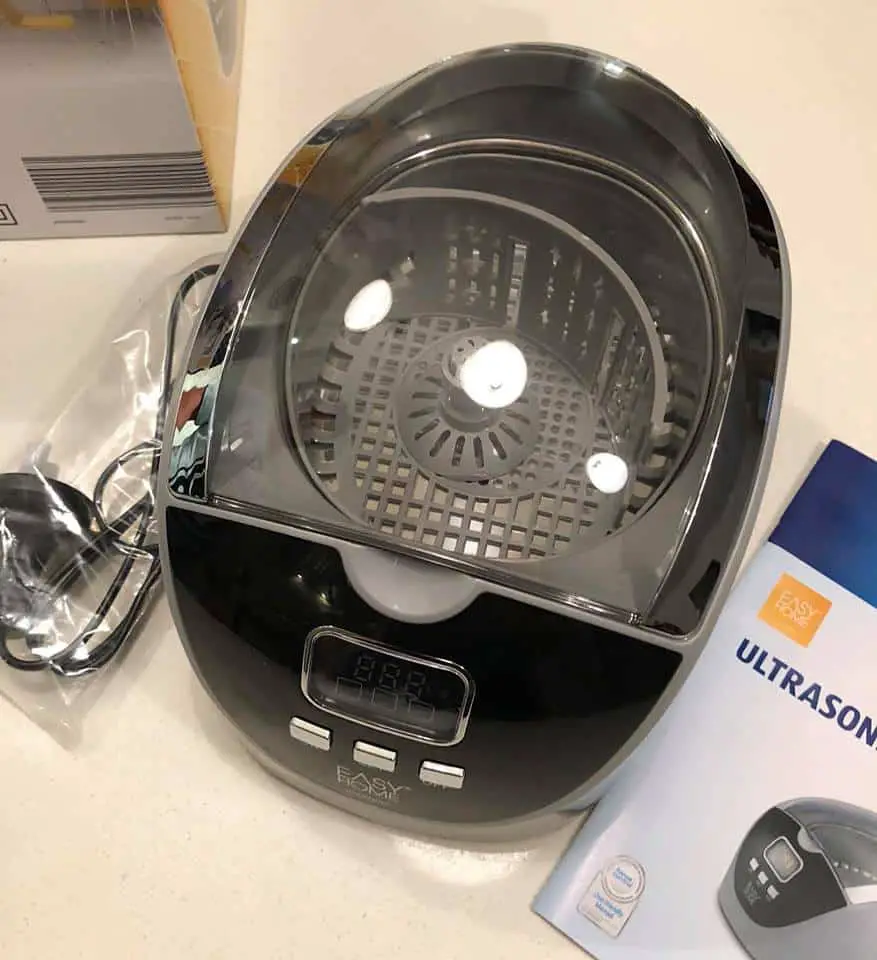
Ultrasonic Cleaner (Check this One Here at Amazon!) will help you clean your coins pretty easily! One of its advantages is the fact that it’s large enough not only to hold all of your coins but also any other item that you want to clean including your Grandfather dentures lol!
Anyway, you generally need to set it to a specific frequency depending on how much cleaning does your item needs! A frequency of around 50kHz is pretty good, yet you may want to increase it to over 100kHz if needed!
2. Rock Tumbler
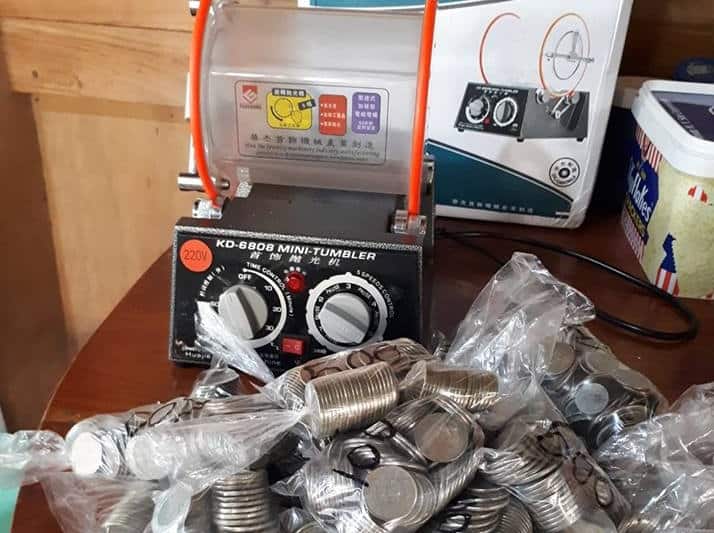
You can clean your clad for example in one tumbler (Check this Professional Tumbler Here at Amazon!). But you need to put pennies, if any, separately though. Rock tumbler and dish soap is generally all what you need in this case. You can add few drops of Gavel also …
This method is generally used for coins that are dirty and/or corroded in a way they can’t be spent. Cleaning them with a tumbler makes them spendable and/or bankable.
It is important to keep the coppers separated. For the rest, it really depends on what kind of coin it is!
This video below explains exactly how to use this method:
4. Electrolysis
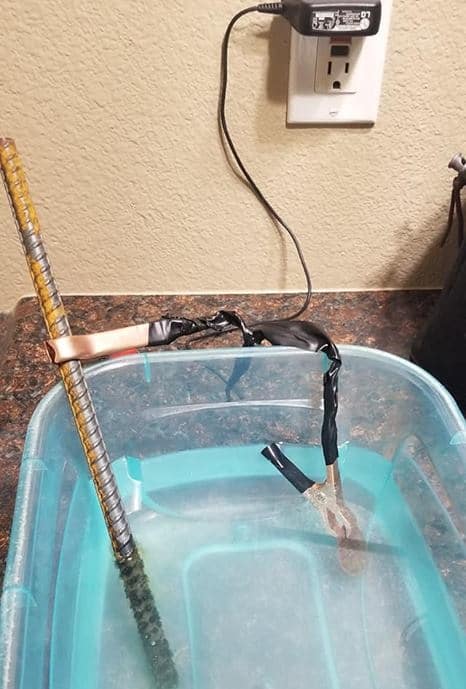
Electrolysis is another famous method among detectorists that you can opt for! It requires salt, water, crocodile pinces and some electricity.
This should be used for spendable coins that don’t have any historical value whatsoever! If you insist on using them for relic coins or ww2 artifacts in general, then you should get some advice form an expert!
Fill a non-metal pot (preferably plastic) with water and add a teaspoon of salt to it. The latter will significantly increase the conductivity (FYI: All minerals increases conductivity).
Cut the cable of any old mobile charger you think you don’t need anymore. Then connect the black crocodile to the negative pole (Place the coin in it) and the red one to the positive pole (place any old iron screw in it).
Plug the charger and hold on for 15-20 minutes or so! Then un-plug it and remove the coin using something made of wood for example to avoid being caught with electricity!
Rinse your beloved coin with water and soap, and then clean it with a sponge.
5. Vinegar
The acidic properties of Vinegar makes from it capable of removing buildup layers of coins like copper oxide. The latter makes from them looking pretty much dull.
By combining salt with vinegar you will make the processes more effective!
All you need to do, is to fill a non-metal bowl with half a cup of vinegar. Then add half a teaspoon of salt to it.
After that, put your spendable coins in it for 10 seconds up to 1 minute depending on how stained they are.
Take out the coins and rinse them out using warm water. This should make them become shinny exactly as they were before.
6. Olive oil
Olive oil has a great ability to soften stains buildup on literally anything, including teeth! In our case, you can use it to clean coins by letting them soak in olive oil until the buildup on them softens enough …
…After that you can use a soft toothbrush to remove the dirt pretty easily!
Conclusion
This Post was very important for me! That is to say, I had to check with about 50 experienced detectorists or even more to make sure that these methods I’ve written for you are legit, accurate and efficient …
… I’ve learnt a lot too, hopefully you did as well!
Cleaning you coins or finds in general is not something that you should take for granted! Not to mention the fact that you really should differentiate between metals the coin was made from! Otherwise you will easily make the mistakes I’ve talked about at the beginning on this Post …
…Finally, if you are aware of any other effective method I didn’t include in this Post, I would love that you mention it in the comment section below! Other people will learn from you …
By the Way, I invite you to Check this Coin Metal Detecting Guide! You will learn a lot on how to come up with coins pretty easily …
